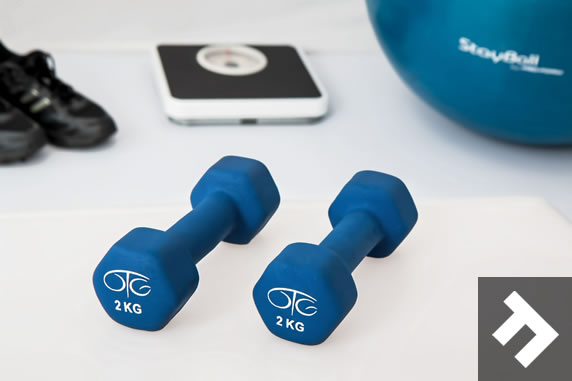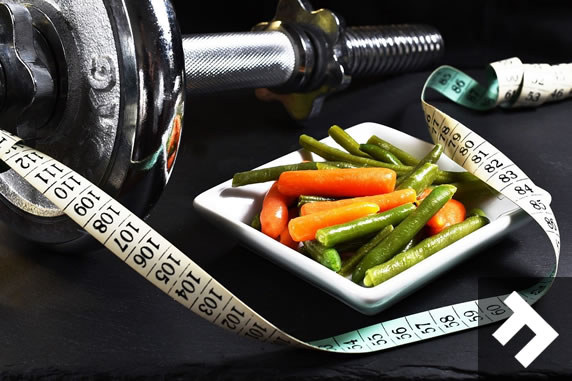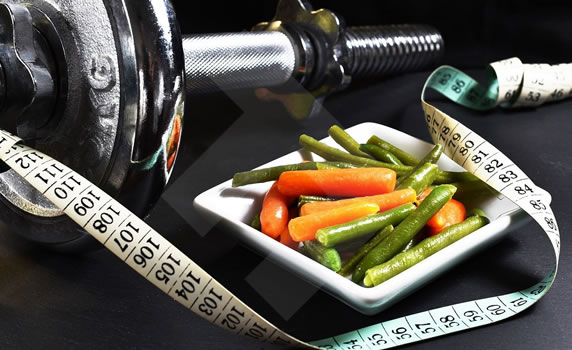Bodies come in all shapes and sizes. Some people are naturally heavier than others simply due to being taller, big boned, more muscular or curvier. This can make it difficult to know when you’re carrying unhealthy excess weight.
To tell if you’re truly overweight, it’s worth doing a variety of tests. You can then decide if weight loss is actually necessary for your health.
Should I use my scales?
Scales can be a pretty inaccurate tool when measuring unhealthy excess weight. This is because fat is not the only bodily component that makes up your weight.

You could be working out like crazy and burning loads of fat, but your weight might stay the same or even go up because you’re building muscle. Muscle is heavier than fat after all.
The water within your body can also have an impact on your weight. You could find that you gain weight from one day to the next, simply because your bladder is fuller and you’re more hydrated on the second day.
The scales also don’t take into account bone structure and healthy fat mass. This makes it possible for one person weighing 85kg to be overweight and another person weighing 85kg to be perfectly healthy simply because they may be taller or have bigger bones. Consequently, you shouldn’t rely on the scales.
What’s your waist size?
Waist size could be a more accurate way of telling whether you’re carrying excess weight, although again it does have its drawbacks.
Excess fat around the midsection can be some of the most unhealthy fat, because it can also have an impact on your internal organs and how they function. This puts you at a higher risk of serious health problems.
You can determine if you have too much waist fat by measuring your waist with a tape measure just below the ribs. Regardless of your natural body composition, you should not have a waist size of more than 94cm (37in) if you’re a man or more than 80cm (31.5in) if you’re a woman. Anything higher than 102cm (40in) should be a particular concern and is a sign you should try to lose weight.

Other factors can affect waist size beyond fat including muscle, pregnancy and bloating. This is where waist size can be deceiving, however you can usually tell by looking at your waist if it is fat or not.
What is your BMI?
BMI is one of the more accurate ways to tell if you are overweight. It uses a combination of a person’s height and weight – you can check out this post to find out how BMI is calculated. A BMI of over 25 is usually considered overweight, while a BMI of over 29.9 is considered obese.
BMI is not always entirely dependable – two people may have the same BMI and one may be unhealthier simply due to sex, age or ethnicity. That said, of all the simple ways to tell if you’re overweight, BMI tends to be the most accurate.
Do you have any health problems?
You are more susceptible to health problems when you’re overweight. Certain health concerns combined with a BMI of over 25 could be a sign that you need to lose weight.
A few health problems that can be more common in people that are overweight include:
- Chronic fatigue – Do you get easily out of breath walking from one place to another? Carrying excess weight puts more pressure on the lungs and can lead to asthma. You may also feel more tired as a result of carrying excess weight
- Joint pain/back pain – Carrying excess weight also puts more pressure on the joints. Carrying more weight around the waist meanwhile causes back pain. Arthritis is common in people that are overweight
- Snoring – Fat stored around the neck can make snoring more likely. Being overweight can also increase your chance of developing sleep apnoea – which can be more dangerous
- Acid reflux – If you regularly get heartburn, bloating and an unpleasant taste in your mouth, you could be suffering from acid reflux. There is a strong correlation between being overweight and having acid reflux
- High blood pressure – If your weight increases, your blood pressure is also likely to increase with it. High blood pressure could be related to being overweight
- Diabetes – If you have diabetes and it was not genetic, it’s possible that you could also be carrying unhealthy excess weight. Diabetes and being overweight are strongly linked
What does the doctor say?

You can ask various people for their honest opinion on whether they think you’re overweight, but no opinion is likely going to be as honest and accurate as that of your doctor. If a doctor has already told you to lose weight to reduce symptoms of health problems, then it’s probably a good indicator that your weight is an issue. Your doctor may also be able to run other tests such as a blood test to determine your cholesterol and blood sugar level.
![]()
 Instagram
Instagram Pinterest
Pinterest Facebook
Facebook Twitter
Twitter YouTube
YouTube




 Paul
Paul 



